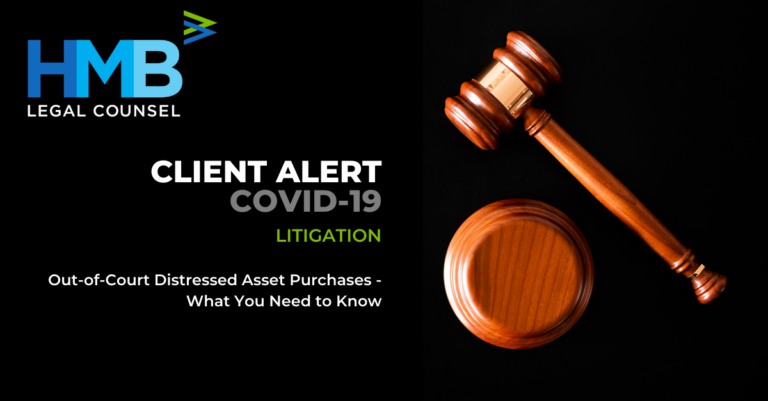Out-Of-Court Distressed Asset Purchases, a Primer
The COVID-19 pandemic has impacted businesses and commercial relationships worldwide, cutting wide swaths of through entire sectors of the economy. The current government regime of subsidizing whole industries and individual businesses is still evolving. Commercial lenders have been incentivized to forbear and defer defaults – but the piper must eventually be paid. Enterprises that were teetering or breaking even before the pandemic will likely find themselves out of liquidity, options and time after the emergency measures end and the fog of war lifts.
Read MoreThese businesses will look to staunch the bleeding and preserve as much value for stakeholders as possible – likely presenting distressed investment opportunities on a scale not seen since the Great Recession of 2007. While distressed sales are typically pushed through as part of the bankruptcy or Uniform Commercial Code Article IX sale process – a strategic purchaser need not necessarily wait until creditors have forced the debtor’s hand. Court-enforced liquidations almost always provide for public notice and opportunity to bid. But purchasers who strategize now may give themselves an opportunity to purchase distressed assets before the crowds of bargain hunters line up outside the courthouse door to bid up the acquisition price.
Here are but a few questions and considerations for out-of-court distressed sales:
What exactly is being purchased?
An out-of-court sale could be structured as an equity sale, a merger or as a simple asset sale. Typically, purchasers desire the asset sale route – so as to cut off liability exposure of the (distressed) selling entity. Successor liability is rarely a problem in court-based liquidations, but an out-of-court purchaser will not have the benefit of a final judicial order defining the terms of the sale and the rights of the seller’s creditors in relation to that sale. Further, in the information age and at a time when service-based enterprises comprise a large portion of the economy, the “assets” being purchased may not be as easily defined and identifiable as physical equipment and inventory. A purchaser should be careful that the out-of-court asset sale does not become recharacterized as a continuation of the (distressed) seller’s business — resulting in successor liability for the buyer.
How much due diligence is necessary?
The first step in this process is almost always a thorough lien search and collateral analysis of the seller’s assets. A survey of financing statements, tax liens, judgment liens and pending lawsuits, as well as title searches of any real property, is critical to ensuring that the purchaser does not pay for another creditor’s collateral. In conjunction with this initial review, the buyer must fully understand whether the seller has the legal right to convey those assets at sale. Often, operating agreements and corporate governance documents require written consents or unanimous shareholder approval – and sometimes lender approval – to convey significant assets. In short, make sure the seller owns the property and has the full and clear authority to sell that property.
Purchase of receivables and other payment rights requires a thorough, fact-intensive understanding of existing set-off and counterclaim rights, as well as the length of any deferments and the nature of the commercial (and sometimes personal) relationships between the payor and payee. A purchaser that is unable to conduct said due diligence should probably value the rights to payment under the worst-case scenario.
Representations and Warranties; Indemnification.
Purchasers typically protect themselves in sale contracts with representation and warranties and indemnification provisions. In a distressed situation, however, the buyer should take as a given that the seller will be unable to perform or cure after closing. Further still, if hold-backs or escrows are agreed to, the funds should be held by an independent third party with strict and clear payment instructions. A buyer should also consider requiring a guaranty from a principal or parent of the seller – though, if the assets are sold “as-is-where-is,” then appropriate discounts should be obtained up front.
There are many other potential pitfalls to be aware of when purchasing distressed assets outside of the legal system – but good counsel can guide you through this minefield to the promised land. HMB Legal Counsel will continue to provide updates as the situation evolves. The ongoing issues related to the spread of the Coronavirus (COVID-19) have had and will continue to have a significant impact on individuals, families, businesses and markets. Visit our collection of resources providing guidance during these fast-changing circumstances. Please reach out to your lead team member to answer specific questions.





